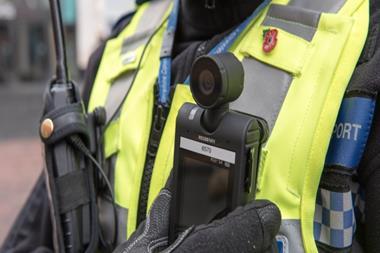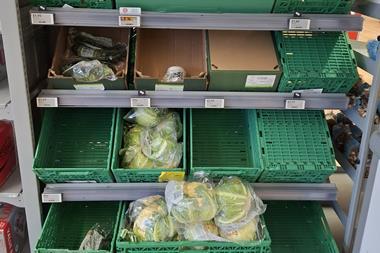For all the UK's efforts to ensure contributions to waste recovery are equitable, the scheme is under fire
Analysis by Paul Gander
Just when retailers thought they were doing their bit for the environment, the cost burden for packaging waste is being cranked up again.
And in spite of the rising costs, by EU standards the UK is reckoned to be slacking and the scheme is increasingly looking like something dreamed up by cowboy builders.
Only a highly reclusive and probably illiterate retailer (if such people exist) could possibly be unaware of the packaging waste regulations that have been in force for at least the past two years. This magazine alone has dedicated several tonnes of recyclable newsprint to the subject.
The UK Producer Responsibility Regulations put into effect the EU's directive on packaging and packaging waste in which the links in the packaging chain from manufacturers of raw materials to retailers each contribute financially to waste recovery. An emphasis has been placed on recycling in preference to other solutions, such as incineration.
Financial obligations are calculated on the tonnage of packaging of all sorts "handled" by the company. For a retailer, this does not mean merely the used and discarded transit packaging; but also every type of consumer pack going through the store. Most of those with obligations choose to channel their yearly dues to the Environment Agency through one of a plethora of organisations set up in the wake of the regulations. The "traded unit" here is the Packaging Recovery Note (PRN) which does not have a fixed price tag.
Retailers are already bemused by the fact that they must shoulder almost half the financial burden for packaging waste recovery in the UK, in contrast to a mere 37 per cent for packer/fillers and less than 10 per cent each for pack converters and raw material producers. And they now face a further hike in the levy on each tonne of waste.
One of the larger compliance schemes, Valpak, has been touting a figure of between 100% and 200% for this year's increase in the cost of PRNs and the British Retail Consortium (BRC), says the cost of most schemes will double, at least.
For a country experiencing the lowest inflation for decades, that is quite a figure. But the calculated cost per tonne of waste is not the only outlay for those companies which, with a turnover of over £2m and handling more than 50 tonnes of packaging, are legally bound to take part (see panel).
Retailers must also make their own calculations on annual liability. This means either buying in outside expertise year after year, or investing in an in-house computerised tracking system. Neither option comes cheap.
The multiples have their own good reasons for ensuring that inventory monitoring systems are in place and have been doing so for some time. But where the smaller retailer is concerned, it is as easy to over-invest as it is to under-invest in high-tech solutions.
The BRC cites the example of one builder's merchant which installed a dedicated £65,000 computer system only to discover that its annual liability in PRNs was just £880! For those handling the very smallest volumes of packaging, PRN payments will, in any case, be dwarfed by the scheme membership and consultancy fees.
But for all obligated retailers, the administration and data collection is almost as much of a burden as the regulations' financial implications.
Financial director of the Botterills chain Wilma Casey complains: "I think the legislation is way over the top in terms of complexity. I don't believe the recycling targets are achievable, because there is no market for the end product. It's just a nightmare. I'd far rather the government said we were not meeting our obligations, and impose a straight levy on company turnover instead," she says.
Botterills uses the consultancy services of the Scottish Grocers Association, which runs its sales data through a model to generate figures for total packaging handled. But longer term, says Casey, such estimates will not be acceptable to the Environment Agency. Even if a database system is developed that would match barcodes with types and weights of packaging, retail chains would need an additional employee to run it.
The longer term burden may well increase for other reasons, with this year's expected surge in PRN prices likely to set the trend for years to come. Why? Because of a mix of local market factors which mark us out from the rest of Europe, and features built into the UK regulations which have got the entire strategy off to a bad start.
Many of our EU partners developed a recycling infrastructure long before UK industry even started arguing over how much which parts of the retail chain should bear. Countries such as Germany are using substantial levies to fuel an already viable recycling network and high recovery rates, while the UK tries to start from scratch in many materials on a shoestring budget.
The UK system's route to even-handedness is one of sheer complexity, which can be a barrier to compliance. As industry environmental group Incpen points out, the "crazy number" of compliance schemes in existence more than 15 at the last count has sparked competition and kept payments lower than in other countries.
But as Incpen director Jane Bickerstaffe explains, the idea of the revenue stream was to fund uneconomic recycling in the UK, and at the moment that is not happening.
Small businesses' exemption from compliance is contributing to the shortfall and helps to explain the rise in PRN prices, says Bickerstaffe.
"It is a shame that they have a de minibus cut-off, so that the smallest companies and retailers do not contribute anything at all," she says.
However, the Association of Convenience Stores helped to establish the exemption threshold and, predictably, disagrees with Incpen's analysis.
Spokesman James Lowman says: "Our data shows that the costs are regressive: the smaller the retailer, the heavier the burden. We are delighted, though, that smaller retailers are exempt." Like Casey, Lowman believes the regulations are ineffective and would fail to bring in substantially more funds even if there was no exemption. That said, he advises any retailers who are obligated, but not contributing, to ensure they do.
"The Environment Agency is getting tougher, and at some time you're going to get caught out," he warns.
Similarly, Jeremy Beadles, director for the environment, property and transport at the BRC, says the Environment Agency is looking at company records for evidence of non-compliance.
Finally, the EU is likely to conclude that, for all our efforts, the UK has failed to meet its recovery targets and so rap our knuckles and impose a hefty fine.
{{FOCUS SPECIALS }}
Close menu
- Home
- Retail & Wholesale
-
Products & Suppliers
- Back to parent navigation item
- Products & Suppliers
-
Product Categories:
- Back to parent navigation item
- Product Categories:
- Alcoholic drinks
- Bakery
- Cereals & breakfast
- Cheese
- Chicken & poultry
- Chocolate
- Confectionery
- Crisps, nuts & snacks
- Dairy
- Fish
- Fresh produce
- Frozen
- Household
- Meat
- Own Label
- Sauces & condiments
- Seasonal
- Soft drinks
- Vaping
- Vegan & plant-based
- World foods
- Suppliers
- People
- Reports & Data
-
Topics A-Z
- Back to parent navigation item
- Topics A-Z
-
Popular topics:
- Back to parent navigation item
- Popular topics:
- Cost of living crisis
- Crime
- Deposit Return Schemes
- Finance
- Government & Regulation
- Health
- Inflation
- Loyalty
- Marketing
- Mergers & Acquisitions
- New Product Development
- Sourcing
- Supply chain
- Sustainability & environment
- Technology
- Ultra Processed Foods
- Vaping
- A-Z all topics
- Content by type:
- Events
- Ask iA (beta)
- Subscribe now
Sign in to comment on this article
Not logged in before? Register for FREE guest access today.
You will be able to:
- Read more stories
- Receive daily newsletters
- Comment on stories
Advert















No comments yet